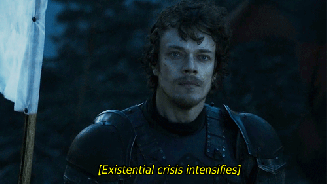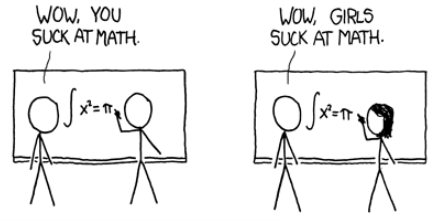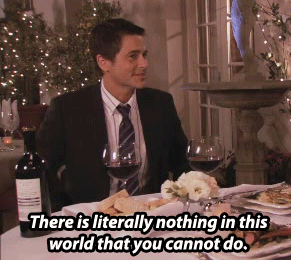 Student staff member Sydney has had a rocky relationship with math throughout her life. As a graduate student in the Applied Sociology program at UMBC she began to rethink her relationship with math through her statistics courses and with the support of her (Women!) professor and TA.
Student staff member Sydney has had a rocky relationship with math throughout her life. As a graduate student in the Applied Sociology program at UMBC she began to rethink her relationship with math through her statistics courses and with the support of her (Women!) professor and TA.
On Thursday September 14, the Women’s Center hosted their first fall roundtable on the topic of Women in Tech. I was there to listen and also write the roundup for the Women’s Center.
 Although I am not a woman in the STEM field, a lot of what was shared really resonated with me and led to a reflection about my relationship with math. Let me start by saying it’s not a positive relationship. I’ve always struggled with math, I feel like it takes me longer than others, my professors (read: male professors) have always seen me as a burden, and now just thinking about it gives me anxiety. I’m talking “I don’t understand anything on this page, I’m going to fail this test, I’m going to fail this class, and I’m never going to get a job and my life is over” types of anxiety.
Although I am not a woman in the STEM field, a lot of what was shared really resonated with me and led to a reflection about my relationship with math. Let me start by saying it’s not a positive relationship. I’ve always struggled with math, I feel like it takes me longer than others, my professors (read: male professors) have always seen me as a burden, and now just thinking about it gives me anxiety. I’m talking “I don’t understand anything on this page, I’m going to fail this test, I’m going to fail this class, and I’m never going to get a job and my life is over” types of anxiety.

I used to say I hated math because I thought I was bad at it, but the roundtable really made me reflect on if this is true or if I’ve just been socialized to believe this. I never thought I was a person who was bad at math; I thought I was bad at math because I was a woman.

Comic from XKCD
Even as a graduate student who passed all of her undergraduate math classes and received an A in graduate level statistics (make note, I had women professors), I still think I’m inherently bad at math, which makes NO sense. This problem exists outside of my experiences as well and is reflected in the disparities between men and women in the STEM fields. For example, although more women are awarded bachelor’s degrees than men, only 17% of computer science graduates are women.
My reflection made me want to reach out to other women to see what their experiences with math were and if this socialization process affected their relationship with math at all. Like many other quests into knowledge, this one did not go quite as planned, but still I received a lot of feedback that included some key themes I think are important.
The first theme is that those who struggled with math or felt as if they were being told they were bad at math, began to feel this way from a VERY early age (most respondents reported between first grade and early middle school). Young girls who were working out math problems were told that if they didn’t understand it right away that they never would and they should basically give up.
The other theme was that most of these comments (or in some cases just dirty looks) came from male teachers. Not only were women being socialized through verbal interactions to believe they were bad at match, they were also aware of the nonverbal interactions between themselves and their male teachers that added to this thought. The patriarchy is alive and well in the classroom y’all.
Here are some responses:
I was talking with a classmate trying to figure out what a problem meant when the teacher came up to us, yelled at us for distracting our classmates, and that if we didn’t understand it – we wouldn’t ever get it. – Rachel (22).
2nd grade, the teacher said I just wasn’t up to it -Jamie (24)
A college professor told me before the class even started that I was either going to fail or drop out of the class, I ended up passing the class with a high B just to prove him wrong -Jill (23)
Most of the women who wrote about these negative experiences also expressed that their negative relationship with math has continue throughout their lives. In terms of their current feelings, they expressed feelings of doubt and anxiety when doing math, or even a complete avoidance of math in life altogether.
I hate it. I’m super intimidated by it. The thought of having to help my daughters with their math homework in the future, terrifies me! -Marie (38)
Some of the women who had negative experiences early on did end up having a good relationship with math later on. Some women have always had good experiences with math. The one common denominator between these positive math women was: a support system, and most of the time this support system was made up of other women (women teachers, Mom’s who worked in the field, etc.).
I had a teacher, Ms. Raden… I don’t know if it was her approach or the fact that she was a woman that made me more comfortable. I took more advanced classes and eventually got a degree where match and equations are big.- Darcy (31).
My algebra 1 teacher went out her way to encourage girls. -Debbie (55)
I think the support I’ve had from my parents encouraging me to pursue math and science in my career has helped me to not feel inadequate in my mathematical abilities. -Caitlin (25).
Most of the responses I gleaned seemed to be aware of the stereotype of women being bad at math and science. Thus, while I expected emotional answers, I was not prepared for the amount of angry responses I received… which were directed at the survey itself and me. A lot of women took offense that I would “assume” they were bad at math or that their experiences were negative. They had never encountered the problem I was bringing up and therefore didn’t think it was an issue on a larger scale either. I have pretty thick skin, but to be honest, shifting through 30 responses with a large amount being very passionate about why I was wrong hit me hard. I immediately wanted to defend myself but also didn’t know how to respond. I didn’t know how to move forward with the blog or get out the message I was originally trying to convey. At first I just wanted to ignore these responses and focus on my original goal, but after reflecting (again) and getting input from coworkers and an amazing supervisor (Thanks Amelia!) I decided I needed to face what was making me uncomfortable head on.
I think it is important to note that women have a variety of experiences, and all of them are valid. While a lot of women have great experiences with math it is also a fact that there are large disparities in the gender makeup of people in STEM fields and that many women have had negative experiences. I want to foster a space as well as a society where all women’s voices are heard but also not at the expense of women with differing stories. Some experiences are good and some are bad but the consequences of a society that largely labels women at a disadvantage are very real. Although women’s involvement is on the rise, there are still barriers that need to be addressed in order for a more equitable field (and society) to emerge.
To the women in STEM fighting against these barriers, I thank you! To the women who feel comfortable in their own skin around math, I envy you! To the women who avoid math at all costs, I understand you! And to the women who can feel their blood pressure rising just when the word is uttered, I am with you!

On Campus Resources:
UMBC Center for Women in Technology
More about the issue:
Women and Math: The Gender Gap Bridged
Women in Math, Science, & Medicine: Still Work to be Done
The Truth About Gender and Math





